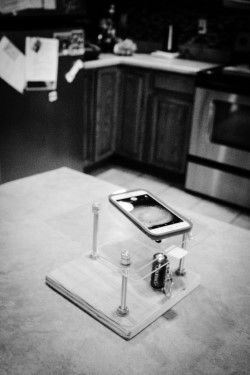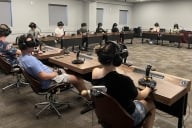You have /5 articles left.
Sign up for a free account or log in.

Missouri S&T encourages students in the general biology lab to use a $10 product from Instructables that allows them to turn their smart devices into microscopes.
Amy Skyles
The Institution: Missouri University of Science and Technology (Missouri S&T) in Rolla near St. Louis.
The Problem: Students at STEM-heavy Missouri S&T often had to take a lab course a semester or two after the accompanying lecture class because growing enrollment forced the university to limit lab class sizes.
“The size of lab courses had become a bit of a hindrance for us,” said Amy Skyles, an instructional designer. “We had seen that there would be a delay in [students’] progress toward graduation. We didn’t want to force students to stay longer because we couldn’t offer them labs.”
General chemistry, in particular, had become a huge bottleneck course for students, Skyles said. Almost every Missouri S&T student is required to take it, including engineering students. Each semester, about 1,200 students are enrolled in the course, but the institution didn’t have enough lab space for that many people.
Compounding the issue was students transferring to Missouri S&T from St. Louis-area community colleges. While these learners may have lecture credits, they often lack lab experience because a lot of two-year colleges don't have the resources and facilities to provide hands-on learning, said Amardeep Kaur, a Missouri S&T assistant teaching professor.
“There’s no way to know if the [transfer students] have the same skill sets,” Kaur said. “What that means is they will be moving onto advanced classes they are not equipped to deal with. A lot of [transfer] students end up retaking those courses … then you end up delaying your intended graduation.”
The Goal: Skyles was assigned as the primary investigator on a project to find or develop methods for delivering lab experiences to online and residential students outside the traditional classroom model. The project's main goal was to figure out how to offer lab skills to every student enrolled in the associated lecture course so the student's learning sequence wasn't impeded, Skyles said. The institution also wanted to streamline the pathway to graduation for transfer students, Kaur added.
Skyles said what Missouri S&T needed to do was “deliver experiential learning to all,” which is how the name of the project -- DELTA Labs -- emerged.
The Experiment: After two years of research, investigation and development, Missouri S&T launched DELTA Labs hands-on classes, allowing students to do experiments and lab work while taking related online, blended, flipped or in-person courses. The program started with just one biology lab course in fall 2014; now eight science and engineering lab classes are offered.
“We’re trying to reach a broader audience,” Skyles said.
Because of the changes, the 1,200 on-campus students who enroll each semester in the general chemistry lecture have an accompanying lab. Likewise, learners taking biology courses online and in person have associated labs, too.
The program also is helping prepare community colleges students who are considering transferring to Missouri S&T because they can sign up for a DELTA Labs course before, too. “For students who know they’re going to come [here], it offers them a direct link,” Kaur said.
There isn't one DELTA Labs model for all eight courses; instead, Skyles and her team evaluate each course to figure out what lab scenario would work best. “That’s what has helped us be successful,” she said.
Still, the most common model incorporates lab kits that students use in their homes, apartments or dorm rooms. Biology and chemistry instructors can develop custom lab kits, but most often, they purchase kits from vendors.
The lab kits come with more than just cell samples and chemical solutions for students to observe. For example, a biology lab kit may include materials for microscopy, identifying cells, sampling pond water and testing for starch and protein. A chemistry set could include chemicals to conduct an experiment to observe processes such as chromatography, solubility, precipitation and titration.
Students submit to their instructors photos, usually taken with their smart phones, to document the experiment or activity step by step. “Submitting photographic evidence has been a big help along the way,” Skyles said.
Although prepared kits are readily available for biology and chemistry classes, engineering lab courses require a little improvising because few companies sell pre-made kits for engineering experiments, Skyles said. This could include the instructor buying, or having students buy, some project materials at a local hardware store, she said.
What Worked (and Why): The first thing the DELTA Labs group had to do was win over skeptical faculty members. The name greatly helped, Skyles said: “Faculty on a STEM campus are reluctant to listen to ideas about 'online learning.' Calling it something different [than online] can be extremely helpful.”
As for the labs, they've been successful because each one is designed to fit the course's unique needs and they've allowed many more students to take associated labs, she said.
What Didn’t (and Why): The DELTA Labs team has had to plan carefully about how to dispose of the experiment materials. If kits are purchased, the team sometimes follow the vendors’ recommended procedures, but other times the group comes up with its own methods.
For example, kit vendors don't account for students enrolled in an general chemistry lab who are living on campus, Skyles said. If the students lived in different towns, disposing the chemicals in their local water system would be fine because the chemicals would be distributed in extremely small quantities. “But multiplied 1,200 times, it might not be safe to dump them down one drain" in the bathroom of a residence hall, the instructional designer said.
To address this issue, residential students are required to turn in their chemical compositions at a campus building. DELTA Labs' staff works closely with the university's health and safety office to ensure the chemicals are disposed properly, Skyles said. Disposal of biology and engineering lab kits isn't an issue because students are spread out among online, in-person and blended courses, she added.
In addition, DELTA Labs has had to be proactive to meet disability requirements so all students can use the lab kits. One thing the group did was add closed captions to every video it produces that shows students how to conduct the experiments, Skyles said.
Finally, DELTA Labs works closely with the university's health and safety office to ensure that the lab kits can be used safely in a home or dorm room. According to Skyles, no students or property have been harmed since the program began.
But, she said: "We feel it is extremely important to keep that experiential learning in the activities. They need to actually be doing [experiments].”
Next Steps: Now that the model has had success in online and in-person biology, chemistry and engineering courses, the goal is to incorporate it into the university’s general course offerings, Skyles said. The DELTA Labs team also wants instructional designers to “connect the dots between lecture design and laboratory course design” so the two operate in synchronization, she said.
For more information: In a webinar for the Online Learning Consortium, Skyles and a colleague, Terry Wilson, describe the process of creating and piloting one of the first DELTA Labs courses at Missouri S&T. They plan to lead more webinars and workshops about the model in the coming months.
“I think we can share our failures and … prevent headaches for others because we learned from those failures,” Skyles said. "We would like to be able to share the information we’ve collected so we can save some struggles for others."
In the Trial and Error feature, we're trying to create a space to discuss institutional experiments with digital technologies -- what worked, what didn't and what other colleges can learn from successes and challenges. Send your nominations for future columns to jean.dimeo@insidehighered.com.








